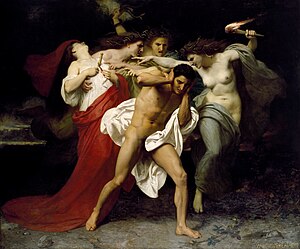Orestes
In Greek mythology, Orestes (in ancient Greek: Ὀρέστης) was the only son of Agamemnon and Clytemnestra.
Mythology
According to Homeric history, Orestes was absent from Mycenae when his father returned from the Trojan War and was assassinated by his wife's lover, Aegisthus, or by Clytemnestra herself according to other versions. According to Pindar, Orestes was saved by his nurse Arsinoe or her sister Electra, who took him out of the country when Clytemnestra wanted to kill him. Orestes fled to Fanote, on Mount Parnassus, where King Strophius took care of him.
On his twentieth birthday, the oracle at Delphi commanded Orestes to return home and avenge his father's death. Orestes returned home together with his friend Pylades, son of Strophius. According to Aeschylus, Orestes met his sister Electra before the tomb of Agamemnon, where both had gone to honor the deceased; They recognized each other and planned how Orestes would carry out his revenge. The same basic story is told in different ways by Sophocles and Euripides in their respective works entitled Electra. in which he was not directly responsible for the latter's death.
In Aeschylus' Eumenides, after revenge (sometimes with the help of Electra) Orestes goes mad and is persecuted by the Erinyes (who do not do the same with Electra), whose duty it is to punish any violation of family love ties. Orestes takes refuge in the temple of Delphi, but Apollo, despite the fact that he had ordered Orestes to take revenge, is not able to protect him from the consequences of it. Finally, Athena receives Orestes in the Acropolis of Athens, and organizes a formal trial of the case before the Areopagus, a court made up of twelve Attic judges. The Erinyes demand their victim, Orestes alleges the mandate of Apollo, the votes of the judges are equally divided and Athena, with her decisive vote, declares Orestes innocent. The Erinyes are appeased with a new ritual in which they are worshiped as Eumenides, and Orestes dedicates an altar to Athena Areia.
In Aeschylus' play, the punishment ends like this. But in the work of Euripides, in order to escape the pursuit of the Erinyes, Apollo sends Orestes to go to Taurus (present-day Crimea), seize the statue of Artemis Tauropola, which had fallen from heaven, and take it to Athens. Orestes marches to Taurus with Pylades, and there they are imprisoned by the inhabitants of the region, the Taurus, who have the custom of sacrificing all foreigners to Artemis. The priestess of Artemis in charge of carrying out the sacrifice is Orestes's sister, Iphigenia, who, unaware that it is her brother, offers to free him in exchange for taking a letter to Greece. Orestes refuses to do so, but tells Pylades to carry the letter while he remains to be sacrificed. After a conflict of mutual affection, Pylades ends up agreeing, but the letter makes Orestes and Iphigenia recognize each other, and the three escape together, taking with them the image of Artemis. After his return to Greece, Orestes kills Aletes, son of Aegisthus, and takes possession of his father's kingdom: Mycenae. He also carries out the annexation of Argos and Laconia.
Before the Trojan War, Orestes had been betrothed to his cousin Hermione, daughter of Menelaus. However, when Menelaus returned from the war, as Orestes was presumed dead during his disappearance, he wanted his daughter to marry Neoptolemus. Orestes and Neoptolemus fought, and the latter was killed. By marrying Hermione and seizing Argos and Arcadia after their thrones had been vacated, Orestes became ruler of all the Peloponnese. His son, Tisámeno, would later be killed by the Heraclids.
In one version of the Telephus story, Orestes was seized by Telephus, who demanded that Achilles heal him.
According to some sources, Orestes fathered Pentilus with his half-sister Erigone.
Orestes is said to have died from a snake bite in Arcadia. His body was taken to Sparta to be buried, and there it would be an object of worship. According to an Italian legend, the body would be taken to Aricia, from where it would be transferred to Rome.
| Ancestors of Orestes | |||||||||||||||||||||||||||||||||||||||||||||||||||||||||||||||||||||||||||||||||||||||||||||||||||||||||||||||||||||||||||||||||||||||||||||||||||||||||||||||||||||||||||||||||||||||||||||||||||||||||||||||||||||||||||||||||||||||||||||||||||||||||||||||||||||||||||||||||||||||||||||||||||||||||||||||||||||||||||||||||||||||||||||||||||||||||||||||||||||||||||||||||||||||||||||||||||||||||||||||||||||||||||||||||||||||||||||||
|---|---|---|---|---|---|---|---|---|---|---|---|---|---|---|---|---|---|---|---|---|---|---|---|---|---|---|---|---|---|---|---|---|---|---|---|---|---|---|---|---|---|---|---|---|---|---|---|---|---|---|---|---|---|---|---|---|---|---|---|---|---|---|---|---|---|---|---|---|---|---|---|---|---|---|---|---|---|---|---|---|---|---|---|---|---|---|---|---|---|---|---|---|---|---|---|---|---|---|---|---|---|---|---|---|---|---|---|---|---|---|---|---|---|---|---|---|---|---|---|---|---|---|---|---|---|---|---|---|---|---|---|---|---|---|---|---|---|---|---|---|---|---|---|---|---|---|---|---|---|---|---|---|---|---|---|---|---|---|---|---|---|---|---|---|---|---|---|---|---|---|---|---|---|---|---|---|---|---|---|---|---|---|---|---|---|---|---|---|---|---|---|---|---|---|---|---|---|---|---|---|---|---|---|---|---|---|---|---|---|---|---|---|---|---|---|---|---|---|---|---|---|---|---|---|---|---|---|---|---|---|---|---|---|---|---|---|---|---|---|---|---|---|---|---|---|---|---|---|---|---|---|---|---|---|---|---|---|---|---|---|---|---|---|---|---|---|---|---|---|---|---|---|---|---|---|---|---|---|---|---|---|---|---|---|---|---|---|---|---|---|---|---|---|---|---|---|---|---|---|---|---|---|---|---|---|---|---|---|---|---|---|---|---|---|---|---|---|---|---|---|---|---|---|---|---|---|---|---|---|---|---|---|---|---|---|---|---|---|---|---|---|---|---|---|---|---|---|---|---|---|---|---|---|---|---|---|---|---|---|---|---|---|---|---|---|---|---|---|---|---|---|---|---|---|---|---|---|---|---|---|---|---|---|---|---|---|---|---|---|---|---|---|---|---|---|---|---|---|---|---|---|---|---|---|---|---|---|---|---|---|---|---|---|---|---|---|---|---|---|---|---|---|---|---|---|---|---|---|---|---|---|
| |||||||||||||||||||||||||||||||||||||||||||||||||||||||||||||||||||||||||||||||||||||||||||||||||||||||||||||||||||||||||||||||||||||||||||||||||||||||||||||||||||||||||||||||||||||||||||||||||||||||||||||||||||||||||||||||||||||||||||||||||||||||||||||||||||||||||||||||||||||||||||||||||||||||||||||||||||||||||||||||||||||||||||||||||||||||||||||||||||||||||||||||||||||||||||||||||||||||||||||||||||||||||||||||||||||||||||||||
| Predecessor: Cilarabes | Kings of Argos | Successor: Tisámeno |
| Predecessor: Menelao | Kings of Sparta | Successor: Tisámeno |
| Predecessor: Aletes or Menelao | Kings of Micena | Successor: Tisámeno |
Orestes in literature
The story of Orestes was the object of the Orestiade of both Aeschylus (Agamemnon, Coephoras, Eumenides) as of Stesichorus, of Sophocles' Electra, and of Euripides' Electra, Iphigenia in Tauride and Orestes. There is an epic poem in Latin, made up of about 1000 hexameters and entitled Orestes Tragoedia, which has been attributed to Draconcio of Carthage.
Orestes also appears as the main character in various legends related to his madness and purification, both in Greece and Asia. In them Orestes is the guilt-ridden mortal purged of his sin by the grace of the gods, whose merciful justice is shown to all people whose crime is mitigated by extenuating circumstances. The relentless blood ties of primitive society allow for a fair trial, and in Athens, when the judges' votes are evenly divided, compassion prevails.
Orestes in contemporary culture
- Orestes is the protagonist of the play The flies written by Jean-Paul Sartre in 1943.
- Orestes is the protagonist of the novel The man who looked like Oresteswritten by Alvaro Cunqueiro; with her, he won the Nadal Prize in 1968.
- Orestes is the title of a song of the year 2000 of the rock group A Perfect Circle; it is based on the mythical theme.
- Orestes is the protagonist of the game Gift from the Gods developed by Ocean in 1984.
- The heavy metal band Virgin Steele recorded two conceptual albums based on the tragedy of Orestes
Contenido relacionado
Inca mythology
Leuce
Xochitónal
Suzaku
Siegfried (character)
